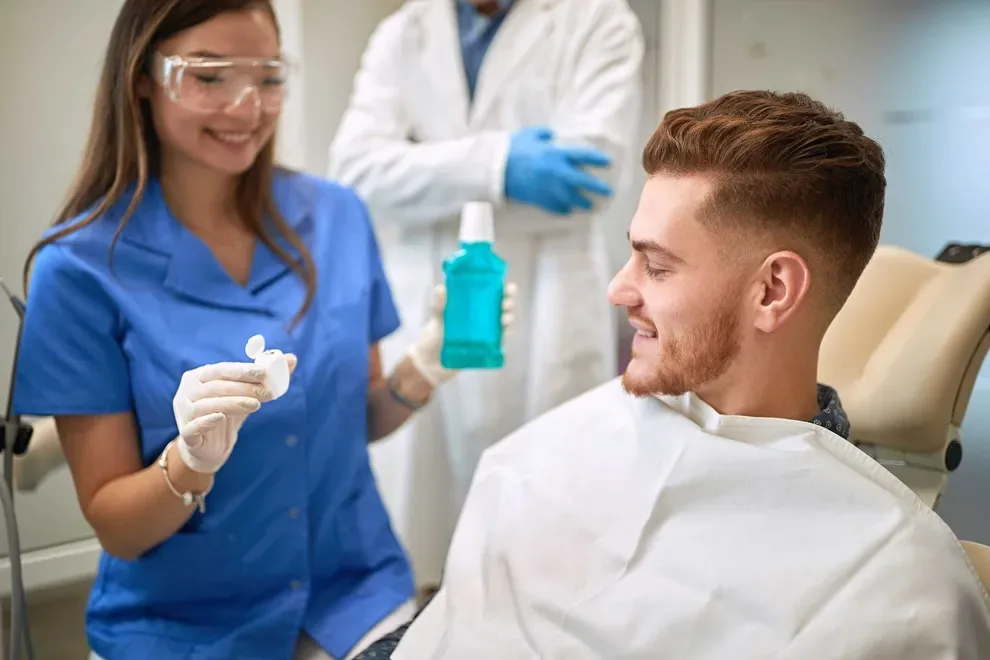What Happens at a Dental Prophylaxis Appointment?

Table of Contents
- What is Dental Prophylaxis?
- What Happens at an Appointment?
- How Often Should You Have One?
- References
Dental prophylaxis appointments are the formal name for routine checkups at your dentist’s office. During these appointments, your dentist will perform a few basic procedures and tests to make sure your teeth and gums are healthy.
Regular dental prophylaxis appointments are designed to help your dentist spot problems before they become serious. Without these appointments, your risk of developing cavities and more serious problems like gum disease goes up.
What is Dental Prophylaxis?
Prophylaxis, taken from the Greek, means to prevent disease or preserve health. Dental prophylaxis appointments, often described as a “prophy” by dentists, are routine wellness visits.
These regular appointments take your medical history, oral health history and any issues you may be having into account. That’s why each prophylaxis appointment is a little different and based on your specific needs.
What Happens at an Appointment?
Dental prophylaxis appointments typically last about an hour, though this may vary based on your oral health. Here’s what happens at a typical check-in:
Your dentist will talk with you about how your teeth and gums feel. You should point out any discomfort or potential issues you’ve noticed. Your dentist will also ask you about any other changes in your medical history since your last appointment.
Your dentist will perform a visual examination of your mouth, teeth and gums. With the help of magnifying tools, your dentist will take a close look at your teeth and gums. They’ll also examine your neck as part of a basic screening for oral cancer.
Your dentist or a dental hygienist will clean your teeth. This is a standard dental cleaning in most cases. Other cleaning procedures like scaling and root planning may be planned. However, you’ll know about these procedures before you visit your dentist since they’ll need to be scheduled ahead of time.
Periodontal probing may be performed. This procedure measures the depth of your gum tissue. Pockets where the gums have pulled away from the teeth are often a sign of gum disease or more developed periodontal disease. This procedure is usually performed if you have a history of gum disease.
X-rays may be taken. Most prophylaxis appointments have X-rays built into the schedule. Depending on your oral health, your dentist may only require X-rays once per year instead of at every appointment.
Your dentist will discuss your oral health care routine with you. They may offer suggestions for products and help you improve your at-home routine by giving you tips on flossing, brushing or caring for dental work like bridges, crowns and implants.
Flossing and polishing procedures will be performed. These procedures are often done by a hygienist instead of your dentist.
Fluoride treatments are usually offered last. Many patients choose to receive fluoride treatment, but it is optional. Sealants used to protect the teeth may be applied at this time as well.
How Often Should You Have a Routine Dental Appointment?
Most people make an appointment to see their dentist for a checkup once every six months. If you have healthy teeth and gums, this is likely the timetable your dentist will recommend to you.
The timing is not coincidental: Many, if not most, dental insurance plans in the U.S. will pay a portion of the cost of this dental visit twice a year.
Individuals who are prone to cavities or have other dental health issues like gum disease may be asked to come in more often. Appointments scheduled every three to four months are also common for people with immune disorders or diabetes, which can put you at greater risk of developing more severe dental problems.
Older adults and seniors may require more frequent dental prophylaxis appointments too. This will vary based on your oral health history and any other health issues you may have, however.
Talk with your dentist at your next visit to determine the right routine for proper oral health.
Dental prophylaxis appointments are essential for maintaining optimal gum and tooth health. Even patients with excellent oral health will benefit from scheduling these appointments regularly.
Reach out today to learn more about finding a dentist or scheduling your next dental prophylaxis appointments. Brushing and flossing, even if you’re vigilant, isn’t enough to keep your mouth as healthy as it should be.
